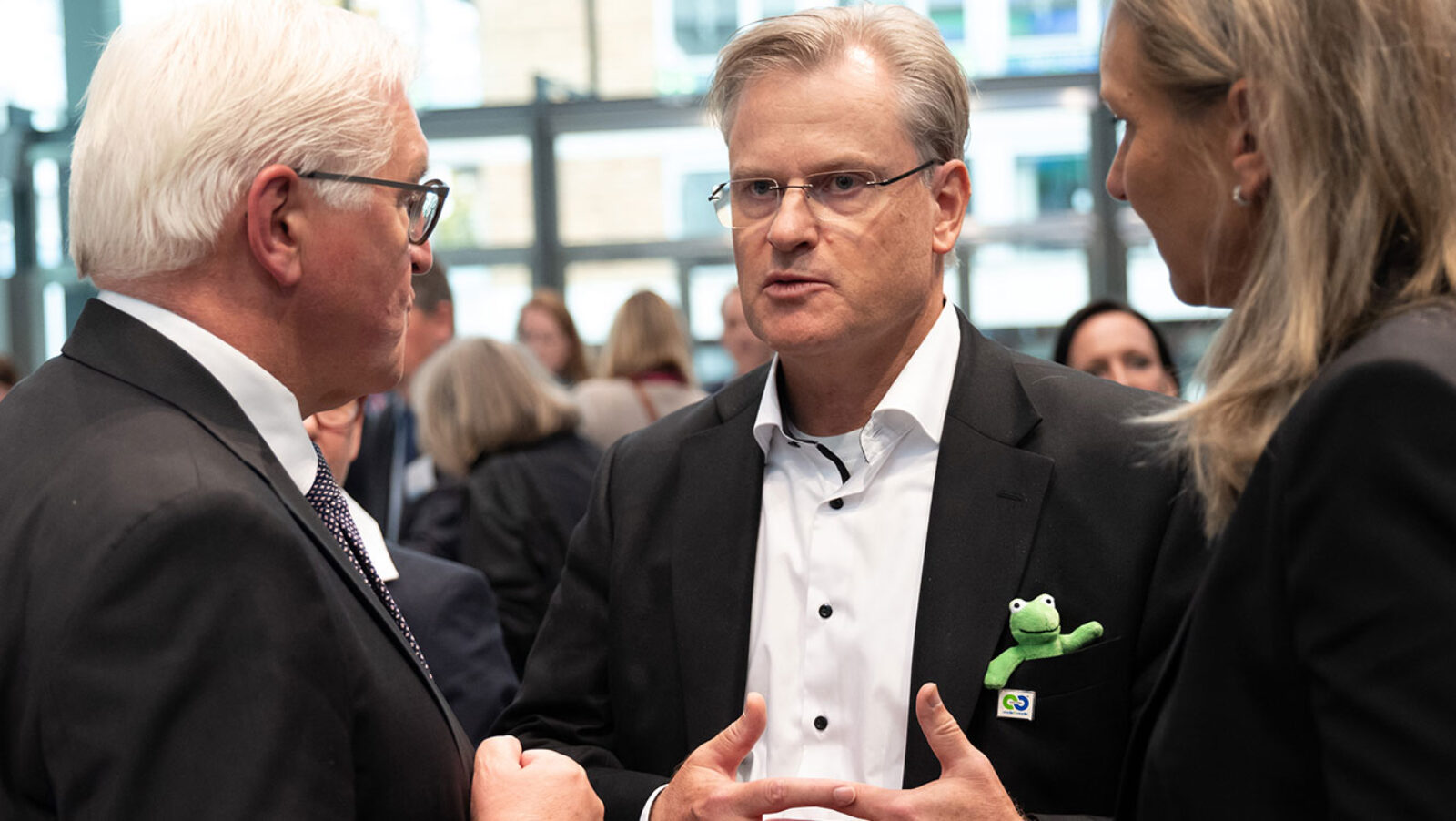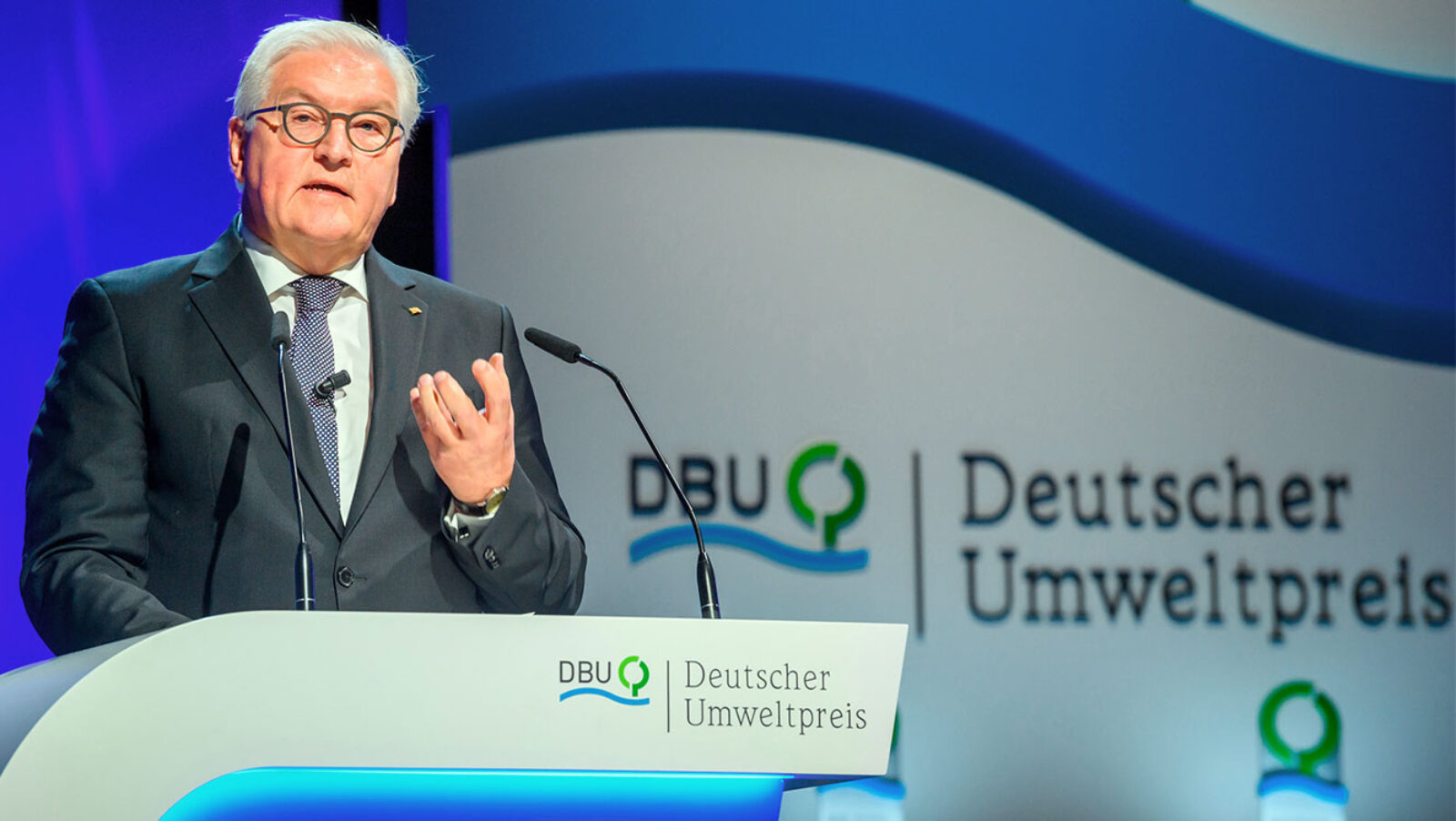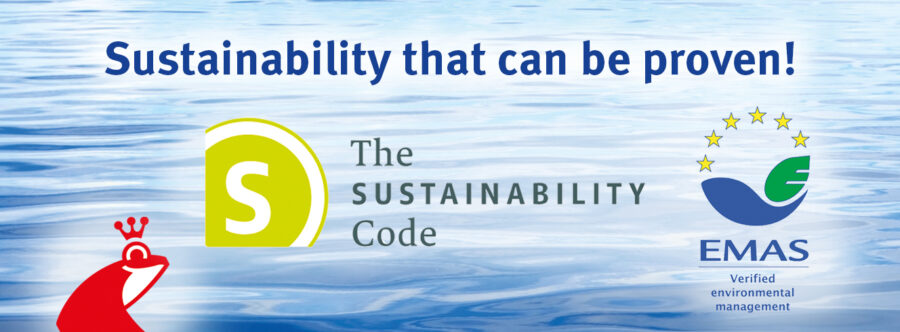Bold decisions today will trigger positive interactions for tomorrow
Federal President Frank-Walter Steinmeier has called on the citizens to “make bold decisions today” in environmental and climate protection to trigger “positive interactions for tomorrow”. “The future is not simply predestined. It’s up to us what we make of it,” he said at the presentation of the German Environmental Award of the Deutsche Bundesstiftung Umwelt (DBU) in Mannheim: “The plastic bottle that is recycled today or not even produced will not end up in the oceans tomorrow. It will be back in the raw material cycle the day after tomorrow. The soil, which is protected from erosion today, binds carbon. And it can still be used tomorrow as farmland to feed people.” Steinmeier presented the soil scientist Prof. Dr. Ingrid Kögel-Knabner from the Technical University of Munich and entrepreneur Reinhard Schneider (Werner & Mertz, Mainz) the highest endowed independent environmental award in Europe with a total of Euro 500,000.

Recognising ecological transformation as an opportunity for Germany
With an audience of around 1,200 guests Steinmeier said, that the prize winners were encouraging because they were pointing to solutions and seeing ecological transformation as an opportunity for Germany. As inventors and engineers, as scientists or entrepreneurs, they would find new solutions. The prize winner Kögel-Knabner is a role model for future generations of researchers. She adds the puzzle piece of soil use to a much larger picture – the global climate and its “truly alarming change”. It is not only factories and power plants that are responsible for climate change but also the use of soil as the planet’s major carbon sinks. Depending on how humans use it, they fuel or slow down climate change. Months of droughts, torrential floods, and destructive storms can be observed in countries of the southern hemisphere. In Europe, too, heat waves are on the rise. Soil science can help people adapt their agriculture to these extremes, which is why the environmental prize winner’s research is so important.
Products and production "fully streamlined for sustainability"
According to the Federal President, the prize winner Schneider acted as a responsible entrepreneur before many others became active. He had shown with true pioneering achievement that environmentally conscious and entrepreneurial activity were not a contradiction, and that he had made this his recipe for success. He had “fully streamlined products and production for sustainability”. Among other things, this means a high degradation rate of surfactants and packaging made of recycled plastic. If more people took a closer look at the supermarket shelf, the pressure on manufacturers to be more environmentally friendly would increase. However, this does not relieve politicians of their responsibility and their regulatory mandate to intervene where the market does not ensure enough or not at all enough environmental and climate protection. Instruments such as transparency, consumer protection through seals of quality, prices that reflect the true costs to the environment and – where necessary – bans are also used.

Hundreds of thousands of young people have already made a difference today
The head of state went on to say that the protection of the environment, the climate and biodiversity had rarely been as important to the entire society as it is today. The remarkable civil commitment of hundreds of thousands of young people has already had a decisive impact today and has “given a tremendous boost” to climate and environmental policy. It has reminded the Germans of the vigour and ambition that can be found in this country, the social and technological forces that have been built up in the area of environment and climate, and “what contribution Germany owes the world”. It has reminded us of the ambitious goals to which the international community has committed itself to under international law. The young people have rightly demanded that the courage and political will to achieve the goals set should actually count. Steinmeier: “Climate policy must be measured by this.” The public attention paid to this extraordinary social movement has created a scope of creativity in which the political parties themselves would still not have believed, but which should be utilised.
Trust in democracy's ability to act should not be underestimated
Of course, he also heard the critical voices of the climate package, the head of state said. But confidence in the ability of democracy to act should not be underestimated however great the challenges may be. Above all, he warned against playing off the participants in this debate against each other: the passion and determination of the young people on the street against the supposed sobriety and sluggish of political procedure. In the democratic process which is now entering a decisive phase of negotiation, passion and determination, readiness for dialogue and reason are needed – radically willing to communicate and passionately reasonable.
"No self-proclaimed strong man will ever be able to match this strength of democracy."
Those who now wanted to sow doubts about democracy, he insisted on asking which other form of government possessed such a power of renewal? Steinmeier: “No lone warrior, no autocrat, no self-proclaimed strong man will ever be able to match this strength of democracy!” No cabinet of experts and scientists, no cabinet of climate researchers can – despite all the irrefutable findings – relieve society of the conflicting goals, the painful considerations and negotiations that are now lining up. An ecological transformation that does justice to the findings of climate science is of course necessary. But as with every far-reaching structural change, there are people who are particularly hard hit by it. People who are worried about losing their own jobs and live in regions where they fear that their children will not find work either. These concerns should not simply be ignored with arrogance. However, they should explicitly not be a pretext for failing to take the necessary measures to protect the climate. Environmental and climate protection must not lead to a split between car industry workers and road blockers, between farmers and conservationists, between those who can afford it and those who must watch every cent. Because climate protection is an ecological and a social task and climate policy is all the more effective, “the more people we take with us on our journey”.
Jury praised prize winners' commitment
As members of the jury of the German Environmental Award, on whose recommendation the Board of Trustees selects the winner of the year, Prof. Dr. med. Heidi Foth, Director of the Institute for Environmental Toxicology at Martin Luther University Halle-Wittenberg; Katharina Reuter, Founder and Managing Director, spoke about the achievements of the 2019 winners. Foth paid tribute to the outstanding research work of the prize winner Kögel-Knabner. She has ensured with her work, with her new research methods and very clear data on which no one can doubt, that the task of soil protection is more clearly defined and more tangible. Above all, Reuter paid tribute to Schneider’s consistent focus on the topic of sustainable management. His recyclate initiative, the creation of more environmentally friendly products for the mass market, the early certification of his company according to the specifications of the European Union, the constantly growing proportion of used plastics for product packaging, the early accession to the initiative “Entrepreneurs for Future” – all these points convinced the jury.
Kögel-Knabner: a handful of soil has more organisms than humans on earth
The prize winners themselves made their positions clear once again in films that were recorded during the ceremony and in discussions with moderator Judith Rakers. Kögel-Knabner said that soils must not only store carbon in order to counter climate change. They would also have to be fertile at the same time, because a constantly growing world population would also have to be fed. An understanding of the role of soils in climate protection has not yet reached society. A handful of soil carries more organisms than humans live on the earth. Climate-related problems such as the thawing of permafrost soils in Siberia are not a regional problem due to the release of greenhouse gases, but a global one.
Schneider: Plastic could be one of the most ecological materials of our time
Prize winner Schneider pointed out that companies should consistently commit themselves to sustainability and be responsible for making attractive offers to consumers without pushing them too much into doing without. This is ultimately not reasonable for many. But this is also possible without compromising ecology. It is important to ensure that the products are easy to recycle as early as the development phase. Different types of plastics should not be combined in such a way that they can no longer be separated. The paradox is that plastic could indeed be one of the most ecological materials of our time, “if we learn to handle it properly”. With a small amount of energy, it can be recycled almost loss-free, so that no more waste is produced.
Headerimage: Joint joy about the German Environmental Award (from left): Moderator Judith Rakers, DBU Secretary General Alexander Bonde, award winner Prof. Dr. Ingrid Kögel-Knabner, German President Frank-Walter Steinmeier, award winner Reinhard Schneider, DBU Board of Trustees Chairman Rita Schwarzelühr-Sutter and Baden-Württemberg Environment Minister Franz Untersteller. © DBU/Peter Himsel





